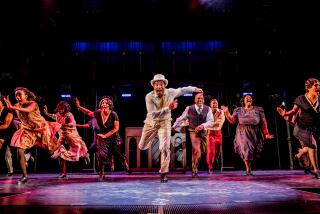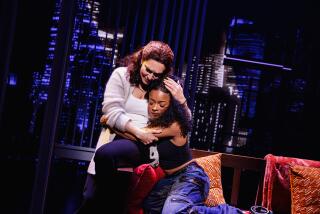Review: ‘Bullets Over Broadway’ misses the bull’s-eye
NEW YORK — “Don’t speak! Don’t speak!”
Dianne Wiest immortalized these words in her Oscar-winning portrayal of aging Broadway diva Helen Sinclair in Woody Allen’s “Bullets Over Broadway,” and I kept murmuring them to myself for a different reason while writing this review of the new musical adaptation.
There’s certainly much to savor in this gin fizz cocktail of a show, tossed back in the Art Deco glory of Prohibition-era New York. But the ostentatious flaws of this much-anticipated production, which opened at Broadway’s St. James Theatre, make it difficult for me to hold my tongue.
“Bullets” was destined for Broadway. Allen’s 1994 movie, written with Douglas McGrath, who also co-wrote the musical’s largely faithful book, is unabashedly theatrical. The film, revolving around ham actors, larger-than-life mobsters and a showbiz-crazed moll, is a felonious farce racing through locales that have the look of vintage stage sets.
PHOTOS: Woody Allen’s highest grossing films
Backstage musicals bring out the best in director and choreographer Susan Stroman, and her production of “Bullets” has electricity that at times matches her high-voltage staging of “The Producers.” Even when the jokes fall flat and the songs (all borrowed from the period, many revamped by Glen Kelly) seem incongruous, the show has the galloping vigor of a runaway hit, if few of the ecstatic peaks.
Santo Loquasto’s glamorous Gotham scenic design and William Ivey Long’s fabulous 1920s pastiche costumes contribute to the illusion that “Bullets” is a smash. So too does the star-making performance of Nick Cordero, who takes on the role of Cheech that was played to perfection in the movie by Chazz Palminteri.
Cordero, who brings the house down delivering “‘Tain’t Nobody’s Biz-ness If I Do” with his fellow gun-toting gangsters providing backup, gives this hit man turned dramaturge a new lease on life.
What a brilliant premise for a musical comedy: David Shayne (Zach Braff of “Scrubs” fame testing out his range), a struggling Greenwich Village playwright, finally gets the backing for his play to be produced on Broadway. Nick Valenti (Vincent Pastore), the mobster behind the money, has only one condition — that there’s a major part for his ditsy dancer girlfriend, Olive (Heléne Yorke, pushing caricature into cartoon).
PHOTOS: Woody Allen’s leading ladies
Accompanied by Cheech, the goon assigned to keep watch over her at rehearsals, Olive threatens to make a shambles of David’s play, which, truth be told, is a bunch of pretentious claptrap. Cheech, tired of listening to phrases such as “a maze beset with brutal pitfalls” (“it stinks on hot ice,” he says), offers suggestions for making the plot more credible and the dialogue less stilted.
Helen Sinclair (Marin Mazzie), the star of the production who has been flirting shamelessly with David so that he’ll revise her role to her vain specifications, likes Cheech’s ideas. So too do the other cast members, including Warner Purcell (Brooks Ashmanskas), the leading man with a compulsive eating disorder who gets drawn into a dangerous dalliance with Olive, and Eden Brent (Karen Ziemba), an eccentric supporting player who travels with her mollycoddled pooch, Mr. Woofles (Trixie).
“Bullets Over Broadway” is a fable about the ruthlessness of being an artist, a racket every bit as cutthroat as racketeering. Mobsters and thespians might seem to be worlds apart, but Allen and McGrath reveal just how temperamentally close they are through the character of Cheech, who becomes more and more proprietary about the play as he rewrites it — so proprietary in fact that he’s willing to kill for his art.
Stroman’s staging moves with an effervescent fluidity — gangsters and flappers glide by, each in high Cotton Club style — yet the book isn’t as spry. Scenes that could be distilled into a few lines are belabored. For all the frenetic Jazz Age motion, the show feels dramatically sluggish.
Something’s slightly out of whack with the performances. There’s some strong singing (Mazzie and Ziemba are vocal standouts), some expert clowning (Ashmanskas really knows how to chomp on a drumstick while selling a musical number) and some solid acting (Braff’s characterization has a few extra notes of authenticity), but only in Cordero’s performance do all three strengths triumphantly merge.
PHOTOS: Woody Allen movies from 1965 to the present
Being unqualified to have an opinion on the subject, I vowed never to comment on the scandal that has been engulfing Allen again. The issue didn’t cross my mind as I enthusiastically set out to attend “Bullets,” but the coarseness of some of the humor (a cringe-worthy number called “The Hot Dog Song,” a dumb Thanksgiving joke with a punch line about raping a turkey) unpleasantly jogged my memory.
Allen’s musical taste, as fans of his films can attest, is superb, and one must assume that the creative team didn’t opt to commission a new score for fear of it being ersatz.
Nick and Olive’s early number, “Gee Baby, Ain’t I Good to You,” works better than anything that could have been expressly cooked up for the occasion. And “Up a Lazy River,” the song that accompanies Cheech as he knocks another victim into the Gowanus Canal, is a gigglingly inspired choice.
But not all of the ditties, refashioned here and there with new lyrics by Kelly, serve the storytelling. And why the inclusion of “Yes! We Have No Bananas” in the grand finale? It’s a minor point, but it indicates how the authors of a show with such enormous potential have made compromises that Cheech would never accept.
More to Read
The biggest entertainment stories
Get our big stories about Hollywood, film, television, music, arts, culture and more right in your inbox as soon as they publish.
You may occasionally receive promotional content from the Los Angeles Times.











